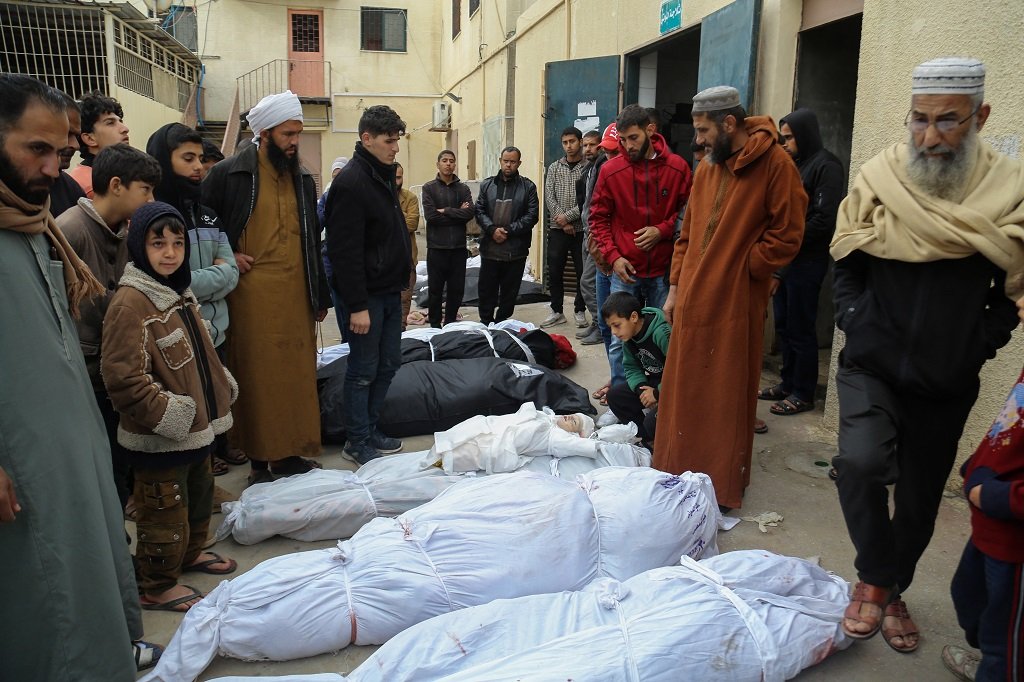Standing amidst dozens of lifeless bodies sprawled on the ground at the emergency department of the Al-Aqsa Martyrs Hospital in Deir al-Balah, in the heart of the Gaza Strip, Mohammed Tabatibi (19 years old) wept for many members of his family who fell victim to an Israeli airstrike.
Mohammed sustained injuries to his left hand during the attack that claimed the lives of 36 of his family members and relatives in the Nuseirat refugee camp in central Gaza.
The survivors suffered injuries in the airstrike that targeted the home of their relatives during the Suhoor of the first Friday night of the holy month of Ramadan. The family sought refuge with their relatives after being forced to flee from the devastated northern Gaza Strip due to the ongoing Israeli aggression since October 7th last year.
Mohammed told AFP while fighting back tears, “These are my mother, my father, my aunt, and my siblings… They bombed the house while we were inside. My mother and aunt were preparing Suhoor… They all died. I don’t know why they bombed the house and committed this massacre.”

In addition to Mohammed’s family members, five martyrs and 30 wounded arrived at the hospital, according to the hospital administration, as a result of Israeli airstrikes that targeted other areas in Deir al-Balah and its surroundings.
The bodies of the Tabatibi family martyrs and other martyrs were placed in a specially designated truck originally intended for transporting humanitarian aid to the central Gaza Strip. The hospital resorted to using it due to the unavailability of cars or trucks and the lack of fuel, as confirmed by one of its officials.
Among the martyrs were several children and two pregnant women. The bodies were wrapped in plastic bags and covers, and some were placed in special burial bags, which have become rare due to the immense toll of martyrs in the Strip since the beginning of the aggression.
A procession of mourners, including three injured family members, followed the truck towards the “Martyrs Cemetery” in Deir al-Balah, where they were laid to rest in a large pit parallel to the main cemetery, which can no longer accommodate more deceased.
After emptying it, traces of blood remained on the truck.
At the site of the destroyed house due to the Israeli airstrike, Youssef Tabatibi, from the Nuseirat refugee camp, continued to search for the victims among the debris scattered over a wide area.
He told AFP, “We are searching for martyrs, and as you can see, we are working with our own hands,” pointing to a white bag, “These are body parts we collected from this four-story house. In the lower two floors, there are martyrs that we cannot extract. We don’t have equipment, bulldozers, machinery, or anything… We are working with our own hands.”
He continued sadly, “We brought shovels and stretchers, but to no avail… Look at the extent of the destruction.”

In the city of Rafah in the southernmost part of the Strip, an Israeli airstrike also targeted the home of the mosque muezzin in the Khirbat al-Adas neighborhood during Suhoor, killing him and his sons.
Their relative and neighbor, Mahmoud Dahir (41 years old), told AFP, “They bombed the house of Hajj Issam Dahir, the muezzin of the Hamza Mosque in the neighborhood, killing him and his sons, Mohammed and Basel. All family members were injured due to the rubble falling on them.”
He added, “Hajj Issam is 60 years old. He had already called for the first Adhan for Suhoor and went to his neighboring house to have Suhoor with his family when they bombed the house while he was eating with them.”
In a sorrowful and condemning tone, he asked, “He was a good man, waking people up for Suhoor and calling for Maghrib at Iftar time… The occupation does not need a reason to kill innocent civilians; it’s just a desire for revenge and killing in this holy month.”
He questioned, “Where is the world, and where are human rights?”
source: WAFA



